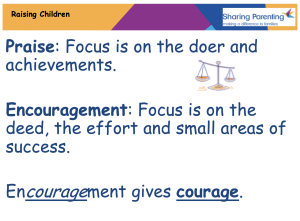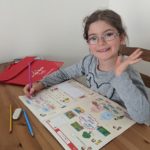We ALL need a bit of encouragement in life – and sometimes more than other times.
When our confidence is low, and our self-esteem is lacking, a little bit of encouragement can go a long way.
So what’s the difference and why does it matter?

Praise: Focuses is on the doer and achievements – in other words the end goal.
This is when you cross the finishing line after running a marathon, getting the job you went for, passing the exam etc.
Encouragement: Focus is on the deed, the effort and small areas of success.
This is the cheerleading along the way. Saying ‘I can see you have prepared well for the interview’, or ‘I’m really proud of the way you focused on that exam’ etc.
When you see the crowds lined up along the route for the marathon they are all demonstrating encouragement. They don’t all wait at the finishing line – from mile 1 to 26 they clap, cheer, whoop and ‘encourage’ the runners along. Many athletes have said this plays a really important part to their success.
Encouragement gives courage.
An example of praise and encouragement

Imagine your child draws a picture:
If you were to Praise you might say “I love your picture”.
They then draw another one and you say “That is lovely.”
With only praise each time the child draws they put in less effort as they know they will be ‘praised’ for anything they draw.
If you were to encourage you might say: “What do you like about your picture?” or “I love the colours you have used and the detail in the house you have drawn.”
With encouragement the next time they draw they put as much or more effort in as they know you are noticing their efforts and not just the end result.
Encouragement builds self esteem
Encouragement is an essential skill to help children grow in self-esteem. It shows them that they are important, capable and loved.
Practice using encouragement

Think of something your child struggles with.
What sort of things might you say to encourage your child?
Think of a time you have encouraged your child or someone has encouraged you.
- What were they doing?
- What did you do / say?
- How did they respond?
- How did it feel?
For example if your child takes their bowl to the sink after dinner but leaves the cutlery and cups on the table you might say “Thank you for putting your dish away I really appreciate it.”
If you child gets 5 out of 10 in their spellings you might say “I am proud of you. I can see you have tried really hard with your spellings – well done.”
Do you encourage yourself?
The best way to practice (and model) encouragement is to start with yourself!
We call this ‘self talk’.
Next time something doesn’t go to plan tell yourself “Well done for trying” or “You did really well to get this far” or “ Not everything in life goes to plan – it’s how we deal with it that matters – we learn more from our mistakes – this is an opportunity to grow”
This short video explains more: https://www.facebook.com/watch/?v=1073583103410189
You can find lots more positive strategies here: www.sharingparenting.com/category/strategies/